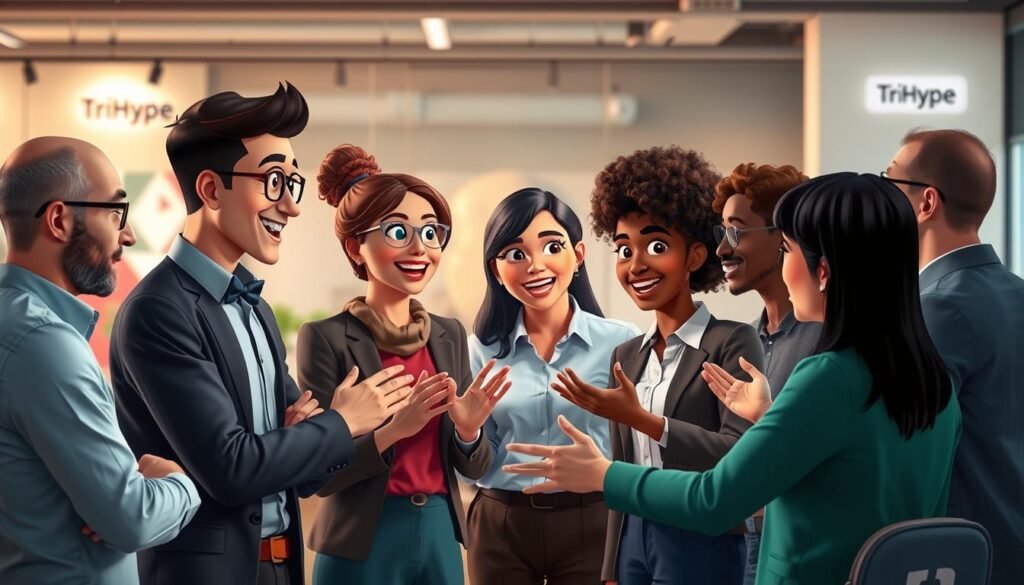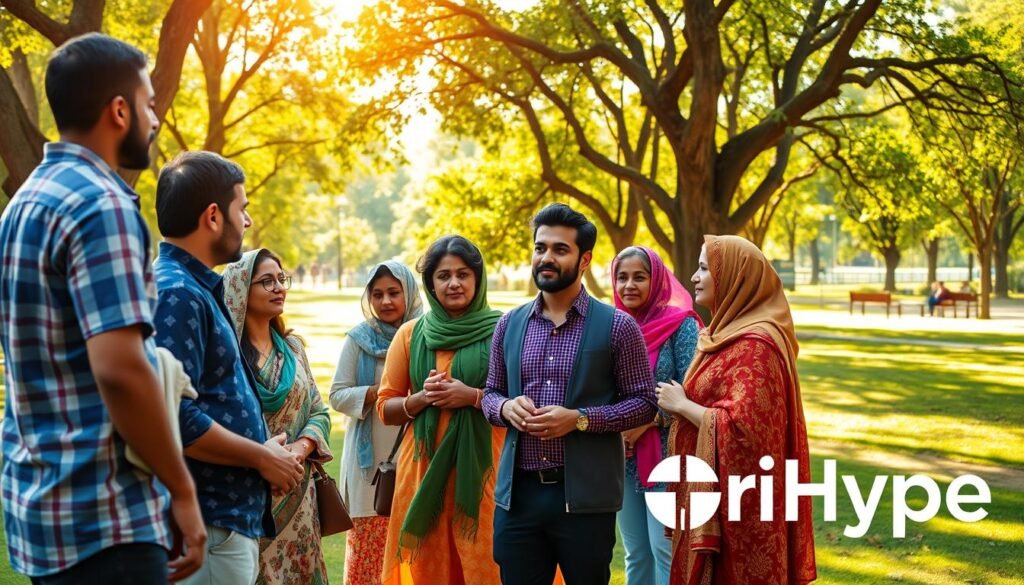Imagine a world where our words can open doors, build stronger connections, and help us reach our dreams. This is our world, and learning to communicate well is key. Let’s explore strategies that can change how we talk to others, leading to great success.
Good communication is the base of strong relationships, clear ideas, and success in work. It’s crucial in tough talks, presentations, or team meetings. We’ll learn how to send clear messages, build trust, and use both words and body language.
Key Takeaways
- Understand the importance of clear and concise messaging in professional settings.
- Discover strategies for building trust and rapport through open dialogue.
- Learn the art of active listening and how it can enhance your communication skills.
- Explore the role of body language, tone, and eye contact in effective communication.
- Adapt your communication style to the digital age, leveraging email, instant messaging, and video conferencing.
The Power of Effective Communication
Effective communication is key to success in work and life. Clear messages help us share ideas and stay on track. Trust and rapport grow through open talks, making teamwork and decision-making easier.
Importance of Clear and Concise Messaging
In today’s busy world, clear and brief communication is crucial. Clear communication makes sure your message is understood, avoiding mistakes. Brief messages keep people focused, avoiding unnecessary details.
Building Trust and Rapport Through Open Dialogue
Good communication is more than sharing info; it’s about making connections and trust. Open talks help build strong bonds. Listening and showing empathy creates a space for understanding, vital for teamwork and making decisions.
“Communication is the lifeblood of any organization or relationship. It’s not just about transmitting information; it’s about building trust, understanding, and a shared vision.” – Jane Doe, Communication Specialist
In our digital age, Dialogue Systems and Conversational AI boost communication and teamwork. They make interactions smooth and efficient, opening up new ways to communicate effectively.

Learning to communicate well opens doors to many opportunities. It strengthens relationships and boosts success in work and life. This skill enriches our personal and professional lives, helping us connect and work together better.
Active Listening: The Key to Understanding
Effective communication is more than just talking. It’s also about listening well. Active listening helps us understand others better. This makes our conversations stronger.
Active listening means we’re fully present when someone talks to us. We pay attention to their words, tone, and body language. This way, we get the real meaning behind what they say.
Improving our language processing and sentiment analysis skills helps us catch subtle emotional cues. We can spot hidden issues and respond in a more thoughtful way.
“The most important thing in communication is to hear what isn’t being said.” – Peter Drucker
When we listen actively, we build trust and rapport. The speaker feels heard and understood. This leads to better conversations where everyone’s voice is valued.
Active listening is a mindset, not just a skill. By truly wanting to understand others, we make our communication more powerful. We create deeper connections.

| Active Listening Techniques | Benefits |
|---|---|
|
|
Verbal and Nonverbal Cues in Communication
Effective communication is more than just words. It’s about the mix of verbal and nonverbal cues that show our true feelings and intentions. By understanding body language, tone, eye contact, and gestures, we can communicate better and build stronger relationships.
Reading Body Language and Tone
Our body language can tell us a lot about our feelings. A clenched jaw or crossed arms might mean we’re uncomfortable or defensive. On the other hand, an open stance shows we’re friendly and engaged. The tone of our voice also adds depth to our message, showing emotions like excitement or doubt.
The Role of Eye Contact and Gestures
Eye contact is key in communication. It builds trust, shows we’re listening, and shows sincerity. Good eye contact makes us feel connected. Avoiding it might mean we’re hiding something or lack confidence. Our gestures also help convey our message, making it clearer for others to understand.
By paying attention to these cues, we can understand the real meaning behind what’s said. This leads to better Communication, Dialogue Systems, Conversational AI, and Sentiment Analysis.

| Verbal Cues | Nonverbal Cues |
|---|---|
| Tone of voice | Body language |
| Pace of speech | Eye contact |
| Volume | Gestures |
| Inflection | Facial expressions |
Communication in the Digital Age
In today’s world, communication has changed a lot. We use many digital tools like email, instant messaging, and video calls. These tools help us connect, work together, and share information. It’s important to use these digital tools well.
Leveraging Email and Instant Messaging
Email and instant messaging are key for work communication. It’s important to be clear, concise, and professional online. This means not being too formal, answering quickly, and making sure your message is clear and direct.
Effective Use of Video Conferencing
Video calls are crucial for working together from different places. To have good video meetings, think about lighting, camera setup, and keeping the background simple. Also, listening well and making eye contact helps in building strong connections online.
| Communication Channel | Best Practices |
|---|---|
|
|
| Instant Messaging |
|
| Video Conferencing |
|
As we move through the digital world, it’s key to use these tools right. By using email, instant messaging, and video calls, we can have better conversations, make stronger connections, and succeed in the digital age.

Communication Across Cultures
When we talk to people from different cultures, good communication is key. We need to understand cultural differences and change how we talk to fit in. This helps us make strong connections, avoid misunderstandings, and have better conversations.
Understanding Cultural Nuances
Every culture has its own way of communicating. To talk well across cultures, we must know these differences. This means paying attention to body language, eye contact, and how close we stand to others.
It also helps to know how fast and how we speak. Knowing these cultural differences helps us avoid mistakes and makes our conversations better.
Adapting Your Communication Style
After we get to know these cultural differences, we need to change how we communicate. This might mean using different words, showing respect with honorifics, or being more or less direct. It’s also important to be careful about what we say to avoid hurting someone’s feelings.
By being open and flexible, we can earn trust and build strong relationships with people from other cultures. This makes our conversations more effective and meaningful.

“Effective cross-cultural communication is not about speaking the same language, but about understanding and respecting the cultural differences that shape how we interpret and respond to messages.”
In today’s world, being able to talk well across cultures is very important. By embracing diversity and changing how we communicate, we open doors to new partnerships, ideas, and understanding.
Conflict Resolution Through Effective Communication
Effective communication is key to solving conflicts. It involves empathy, listening well, and finding common ground. This way, we can tackle tough situations, address concerns, and find solutions that work for everyone.
At the core of solving conflicts is good dialogue. When a conflict arises, it’s crucial to create a safe space where everyone feels heard and valued. This means listening carefully to others, understanding their views, and finding out why they disagree.
Using sentiment analysis is also vital in conflict resolution. It helps us grasp the emotions and words used, revealing the conflict’s true reasons. This way, we can address the deeper needs and concerns of all involved.
Clear communication is also important. We need to express our own needs and views clearly but also with empathy. This helps build mutual understanding and encourages working together to solve problems.
“The greatest communication skill is the ability to listen.”
In the end, how we communicate during conflicts can greatly affect the outcome. By using these strategies, we can turn conflicts into chances for growth, understanding, and stronger relationships.
Communication in Team Settings
In today’s fast-paced work environment, effective communication is key to successful team dynamics. By creating a culture of open dialogue and inclusivity, we can use diverse perspectives to drive progress. This helps us achieve shared goals.
Fostering Collaboration and Inclusivity
To build a collaborative and inclusive team, we must encourage active listening. We need to give all members chances to share their ideas. Regular team meetings, brainstorming sessions, and one-on-one check-ins help everyone feel heard and valued.
Giving and Receiving Feedback
Constructive feedback is crucial for team growth and development. Creating a feedback-friendly environment helps team members improve their skills. When giving feedback, focus on specific behaviors and offer actionable suggestions, not personal judgments.
Using Dialogue Systems and Conversational AI can improve team communication. These technologies help teams exchange information smoothly and work together better. They make it easier to coordinate tasks and make decisions based on data.
“Effective communication is the lifeblood of any successful team. It fosters collaboration, drives innovation, and unlocks the full potential of our collective talents.”
By making communication a priority in team settings, we create an environment where everyone’s voice is heard. Ideas are celebrated, and progress is made in a cohesive and purposeful way.

Communication for Leadership and Influence
Effective communication is key for successful leaders. It helps us inspire and influence others. We can share our vision clearly and build trust with our teams.
Leaders who are good at clear dialogue drive progress. They achieve goals together with their teams.
Effective leaders use Dialogue Systems and Conversational AI. These tools help them connect with people and get feedback. They make communication open and clear.
By using these tools, leaders can send messages that really hit home. They can meet the needs of their teams in a meaningful way.
- Cultivate Adaptability: Adjusting our communication style is key for strong relationships and change.
- Embrace Empathy: Understanding others is crucial for leaders who inspire action.
- Practice Active Listening: Listening shows we care about our teams and stakeholders. It builds trust.
| Effective Communication Strategies | Benefits for Leadership and Influence |
|---|---|
| Clarity and Concision | Ensures your message is easily understood and remembered |
| Empathy and Emotional Intelligence | Fosters strong interpersonal connections and builds trust |
| Adaptability and Flexibility | Allows you to tailor your approach to different audiences and situations |
By using communication well, leaders can change their organizations. They inspire their teams and make a big impact. Becoming better communicators unlocks our leadership potential.
“The art of communication is the language of leadership.” – James Humes
Improving Your Communication Skills
Getting better at communication takes work, practice, and a desire to keep getting better. By looking for ways to improve our communication, language processing, and dialogue systems, we can keep up with changing ways of talking. This makes us better at sharing our thoughts and ideas.
Embrace Continuous Learning
Communication is more than just words. It’s also about how we act and react. To get better, we need to try new things, listen to others, and keep working on our skills. This could mean going to workshops, reading books, or practicing listening and understanding others.
Leverage Technology and Resources
Today, technology can really help us talk better. Using tools for working together online, learning how to write good emails, and getting good at video calls can make a big difference. These tools help us keep up with new ways of talking and understanding each other.
Cultivate a Growth Mindset
Improving at communication means being open to learning and growing. Seeing communication as a journey helps us stay flexible and ready for new challenges. This mindset helps us overcome obstacles and keep getting better at talking and listening.
“The single biggest problem in communication is the illusion that it has taken place.” – George Bernard Shaw
By practicing, listening to feedback, and staying open to learning, we can get better at communication. This makes us more effective in our daily lives and work.
The Benefits of Effective Communication
Effective communication is key to success in both personal and professional life. It helps us achieve more by being clear and thoughtful in our words. This leads to better relationships, more productivity, and smarter decisions.
One big plus of good Communication is building trust. When we talk openly, we connect better with others. This trust makes teamwork easier, negotiations smoother, and personal relationships stronger.
Also, good Communication is crucial in the digital world. With emails, chats, and video calls, clear messages are essential. Learning to communicate well online helps avoid mistakes and ensures our messages are understood.
In our personal lives, effective Communication is just as important. It helps us solve problems, give feedback, and connect with family and friends. By listening well and expressing ourselves clearly, we build deeper relationships.
In the end, good Communication changes our lives for the better. It helps us reach our goals, build strong relationships, and grow personally and professionally.
| Benefit | Description |
|---|---|
| Improved Relationships | Effective communication fosters trust, rapport, and deeper connections with colleagues, clients, and loved ones. |
| Increased Productivity | Clear and concise messaging, coupled with active listening, enhances collaboration and streamlines workflows. |
| Better Decision-Making | Effective communication allows for the exchange of diverse perspectives, leading to more informed and well-rounded decisions. |
| Enhanced Problem-Solving | Open dialogue and the ability to express and understand different viewpoints facilitate more creative and collaborative problem-solving. |
“The single biggest problem in communication is the illusion that it has taken place.” – George Bernard Shaw
Communication in Personal Relationships
Good communication is key for both work and personal life. It helps us build strong bonds with family, friends, and loved ones. By talking openly and listening well, we make our relationships more meaningful and fulfilling.
Being able to share our true feelings is important. Dialogue systems and sentiment analysis help us express our thoughts better. This leads to deeper conversations and a better understanding between us.
Listening actively is also crucial. When we really listen, we show we care. This makes our loved ones feel heard and valued. It builds trust and closeness.
Dealing with conflicts well is another important skill. By being open-minded and willing to find common ground, we can overcome tough times. This makes our relationships stronger and more resilient.
| Communication Strategies for Stronger Personal Relationships |
|---|
|
Using these strategies can help us create deeper connections. It builds trust and makes facing life’s challenges easier and more rewarding.
“Effective communication is the foundation of any healthy relationship, personal or professional.”
Overcoming Communication Barriers
Effective communication is key to success. But, obstacles can get in the way. It’s important to tackle these barriers to ensure our messages are clear. We face challenges like language differences, cultural biases, and tech issues.
We need strategies to overcome these hurdles. This way, we can improve dialogue systems and conversational AI.
Language and cultural differences are big barriers. When talking to people from other cultures, we must be careful. We should use simple language and visual aids. Sometimes, we need translators or interpreters.
Cultural biases can also block our messages. We must recognize and challenge our own biases. By listening and adapting, we can connect better with others.
Technology can also be a problem. Slow internet or unfamiliar tools can mess up our talks. Keeping up with tech and solving problems quickly helps us stay connected.
By tackling these barriers, we can make sure our messages get through. Learning, being flexible, and engaging in real talks are crucial. These skills help us succeed in work and life.
Strategies for Overcoming Communication Barriers
- Embrace language diversity and adapt communication style
- Acknowledge and address cultural biases
- Stay up-to-date with emerging communication technologies
- Engage in active listening and seek feedback
- Continuously learn and adapt to maintain effective dialogue
“Effective communication is the foundation of success in any endeavor. By identifying and addressing the barriers that hinder it, we can unlock new levels of collaboration, understanding, and achievement.”
Public Speaking Tips for Beginners: Start Strong
Conclusion
Effective communication is key to success in our personal and work lives. By learning and using the strategies from this article, we can share our ideas better. This helps us build strong relationships and reach our goals.
Improving our communication skills is an ongoing process. It’s important to keep practicing and getting better. By using dialogue systems, conversational AI, and improving our understanding of emotions, we can communicate more clearly and with empathy.
The world of communication is always changing. Being able to adapt and innovate is crucial. Whether we’re talking face-to-face, online, or across cultures, clear messaging, listening, and being flexible are essential. By adopting this approach, we open up new opportunities and create lasting connections that lead to success and happiness.
